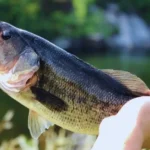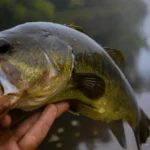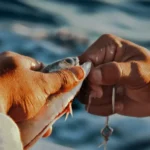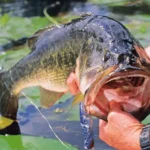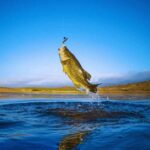When it comes to the excitement of angling, anglers may choose between ice fishing and open-water fishing for two very different adventures. In this side-by-side analysis, we’ll look at the advantages and disadvantages of ice fishing and open-water fishing to help you decide which one is best for you. So, whether you’re drawn to the frozen tranquillity of icy lakes or the sun-dappled expanses of open waters, let’s unravel the enticing possibilities encapsulated by the pros and cons of ice fishing vs open water fishing.

Ice Fishing: Pros and Cons
Pros of Ice Fishing
- Many fishermen like ice fishing because of the tranquil atmosphere it provides. Some of its benefits are as follows:
- Access to Hard-to-Reach Spots: Frozen lakes and ponds make it easier to reach areas that are inaccessible during the warmer months.
- Less Competition: Since fewer people go ice fishing than fish in open water, you’ll have more time to yourself and fewer anglers to compete with.
- Comfortable Conditions: Ice fishing is a great way to relax on a quiet winter day. You may relax in the quiet of the frozen countryside.
- Specialized Equipment: Ice fishing adds a new excitement for gear aficionados due to the need for specialized equipment, including ice augers, shelters, and specialist rods.
Cons of Ice Fishing
However, ice fishing has its downsides:
- Weather Dependency: Safe ice thickness is crucial for ice fishing. The ice may become dangerously unstable due to the unpredictable weather.
- Limited Access: You can only travel to and from fishing holes on the ice, limiting your freedom of movement and exploration.
- Harsh Conditions: The rigours of winter weather are well-known. Inadequate clothing and gear may lead to frostbite and hypothermia.
- Variable Success: The catch is not always apparent. Your odds of success decrease in the winter since fish are less active.
Open Water Fishing: Pros and Cons
Pros of Open-Water Fishing
There are benefits unique to fishing in open water:
- Diverse Techniques: Casting, trolling, and fly fishing are just some of the methods at your disposal.
- Active Fish: Fish are more active and easier to catch when water temperatures are higher, so fishing in warmer waters might pay well.
- Freedom of Movement: You aren’t restricted to a single little pond. You are free to roam all across the body of water.
- Comfortable Weather: If you’re going fishing, try to time your trip such that you have good weather.
Cons of Open-Water Fishing
The downsides of fishing in open water include, however:
- Crowded Locations: Popular fishing areas might become too crowded, ruining the peaceful experience.
- Equipment Complexity: Different methods call for different tools, which might be confusing for newcomers.
- Dependency on Seasons: Since fish behaviour varies throughout the year, planning your visits to coincide with the best times to catch them is crucial.
- Environmental Factors: Fishing success and behaviour may be influenced by environmental conditions such as water currents, wind, and water clarity.
Factors to Consider
There are a few things to keep in mind while deciding between ice fishing and open-water fishing:
- Weather Conditions: Open-water fishing may be more to your liking if you’d rather avoid the cold. Cold weather is inevitable while ice fishing.
- Target Fish Species: Various fish species have seasonal activity patterns. Learn as much as you can about your target catch’s behaviours.
- Equipment and Gear: Consider if you already possess or are willing to acquire the tools needed for either approach.
- Safety Considerations: Both approaches provide potential dangers. When fishing on the ice, one must take into account the thickness of the ice. While in open water, one must be aware of the dangers of the water.
Making the Choice
Whether you go ice fishing or fish in open water depends on personal taste, how well you handle the cold, and what you want to catch. Depending on your degree of risk tolerance and sense of adventure, one of these options is sure to be the perfect fit for you.
Pros and Cons of Ice Fishing vs Open Water Fishing [FAQs]
Is ice fishing more dangerous than open-water fishing?
Ice that is too thin or fragile makes ice fishing more dangerous. These dangers may be reduced with the proper precautions, however.
Can I use the same fishing gear for both methods?
Ice augers and shelters are two examples of specialized equipment for ice fishing, while some gear may be shared.
Which method offers a higher chance of catching larger fish?
Larger fish are more active in higher temperatures, increasing your chances of capturing them when open-water fishing.
What are some safety tips for ice fishing?
Always make sure the ice is thick enough before venturing out, and never go fishing alone unless necessary.
Are there specific regulations for ice fishing and open-water fishing?
The rules may change depending on the time of year and the place. You should probably double-check the fishing regulations in your area.
Conclusion
Every fishing technique has its unique appeal and difficulties in this dynamic sport. When comparing ice fishing to open-water fishing, it’s evident that factors like personal choice and time of year are significant factors in this angler’s conundrum. Whether you prefer the quiet of frozen lakes or the open expanses of the open sea, you can make the most of your fishing trips by being aware of the advantages and disadvantages of ice fishing and open-water fishing.


